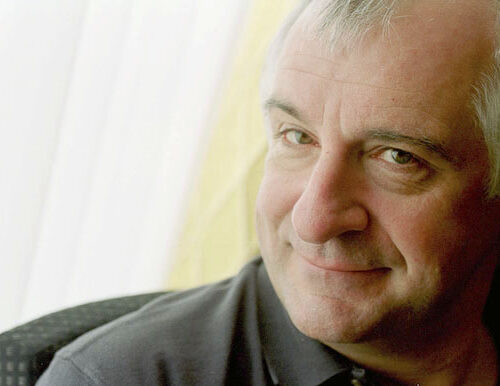

Isn’t it enough to see that a garden is beautiful without having to believe that there are fairies at the bottom of it too?
Douglas Adams, The Hitchhiker’s Guide to the Galaxy (1979)
Douglas Adams was a writer and humanist, best known for his contributions to science fiction, particularly the wildly popular The Hitchhiker’s Guide to the Galaxy series—a quote from which was displayed on London tube trains as part of Humanists UK’s 2009 atheist bus campaign. Adams described himself as a ‘radical atheist’ (‘just to signal that I really mean it’), and used his writings to probe philosophical and religious ideas. Awestruck and inspired by science and evolutionary biology, all of Adams’ work, wrote his biographer Nick Webb, ‘was imbued with a sense of the wonderful improbability of life itself’.
Sometime around my early thirties I stumbled upon evolutionary biology… [and] it all fell into place. It was a concept of such stunning simplicity, but it gave rise, naturally, to all of the infinite and baffling complexity of life.
Douglas Adams, interview with American Atheists, published in The Salmon of Doubt: Hitchhiking the Galaxy One Last Time (2002)
Born on 11 March 1952 in Cambridge, Adams displayed an early interest in writing and storytelling. He won a place at St John’s College, Cambridge to study English, where he became active in Footlights—the famed university sketch comedy society. Adams described himself as being a committed Christian during his teenage years, until an encounter with a street evangelist when he was around 18 prompted him to seriously examine his religious ideas for the first time.
Adams’ literary career took off with the success of his radio series The Hitchhiker’s Guide to the Galaxy in 1978, which later expanded into five novels, a television series, and multiple other formats. Dirk Gently’s Holistic Detective Agency was published in 1987, and The Long Dark Tea-time of the Soul the following year. Adams’ unique blend of wit, satire, and philosophical musing earned him a devoted fanbase. The Hitchhiker’s Guide series, in particular, became a cultural phenomenon.
In addition to his writing, Adams was known for his open atheism. He identified as a ‘radical atheist’, arriving at this position from an earlier agnosticism upon discovering evolutionary biology during his early 30s. In an interview for American Atheists, he told Dave Silverman:
If you describe yourself as “Atheist,” some people will say, “Don’t you mean “Agnostic’?” I have to reply that I really do mean Atheist. I really do not believe that there is a god – in fact I am convinced that there is not a god (a subtle difference). I see not a shred of evidence to suggest that there is one. It’s easier to say that I am a radical Atheist, just to signal that I really mean it, have thought about it a great deal, and that it’s an opinion I hold seriously.
This perspective was evident in his writings, where he used humour and satire to critique religious institutions and explore existential questions. In the same interview, Adams noted that his fascination with religion naturally spilled over into his writing:
I am fascinated by religion. (That’s a completely different thing from believing in it!) It has had such an incalculably huge effect on human affairs. What is it? What does it represent? Why have we invented it? How does it keep going? What will become of it? I love to keep poking and prodding at it.
For Adams, the ‘stunning simplicity’ of evolutionary biology evoked the same kind of awe as was often described in terms of religious experience, but the scientific explanation held far greater power for him: ‘I’d take the awe of understanding over the awe of ignorance any day.’ This fascination with science and nature extended to conservation efforts. Last Chance to See, a book about endangered species co-written with zoologist Mark Carwardine, was his favourite work.
The Answer to the Great Question… Of Life, the Universe and Everything… Is… Forty-two.
Douglas Adams, The HitchHiker’s Guide to the Galaxy (1979)
Douglas Adams died aged 49 on 11 May 2001, leaving a legacy of literary innovation and a unique perspective on life, the universe, and everything. A humanist of creativity and compassion, his influence continues to resonate with readers, and his work remains celebrated for its humour and intelligence.
Interview with Douglas Adams | American Atheists (via the Wayback Machine)
Douglas Noël Adams | Oxford Dictionary of National Biography
Douglas Adams | Desert Island Discs
Main image: Douglas Adams by Michael Hughes CC BY-SA 2.0
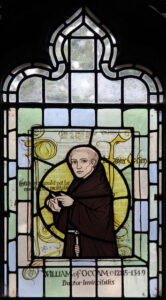
William of Ockham was the fourteenth century’s most influential philosopher: a key thinker of the Middle Ages and an early […]
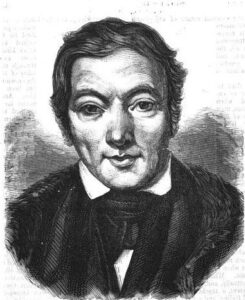
Robert Owen was a utopian socialist, philanthropist, and reformer, whose own religious scepticism fostered his desire for a secular society, […]
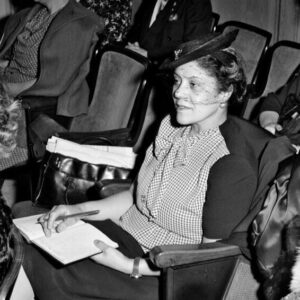
I am willing and eager to surrender as much of my personal sovereignty as is necessary, in order to secure […]
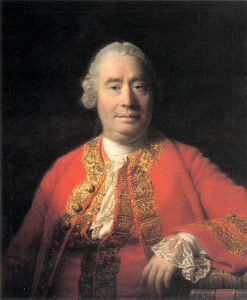
Without any great effort of thought, I believe that I could, in an instant, propose other systems of cosmogony, which […]